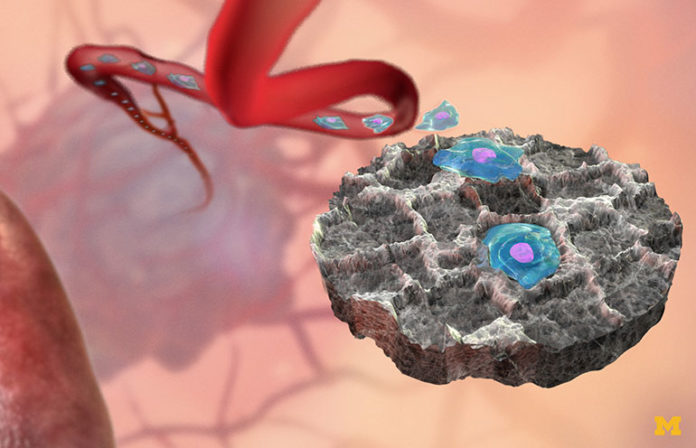
Conceptual illustration of implantable sponge-like device attracts cancer cells from the bloodstream.
As everyone knows, while a cancer starts in one organ it eventually spreads to other parts of the body. It may seem random, but the malignancy is directed by the initial tumor to spread to specific organs by co-opting the natural processes of the immune system for its own cause. Affected immune cells that do the bidding of the primary tumor gather in large quantities in specific parts of the body and signal to circulating tumor cells (CTCs) shed by the same tumor to gather around them. Now researchers at University of Michigan created an implant that mimics the behavior of these immune cells and attracts CTCs to stick to it rather than where the cancer would naturally spread.

U-M Researchers construct cancer “super-attractor” scaffolds from mouse tissue, using a tumor as a control in the experimental process at the NCRC.
The implant doesn’t try to hide itself from the immune system, instead gathering immune cells around it which in turn end up attracting circulating tumor cells. When the CTCs reach the implant, they find specially designed cozy nooks to plant themselves in. This prevents them from ending up somewhere else, and when the CTC are in the implant they seem not to grow into a an actual tumor.
The researchers behind the new technology tested it on lab mice and showed that cancer spread to the lungs of the animals 88 percent slower than when not using the implant.
The next step is to design a way of easily checking the contents of the implant to identify whether the primary tumor is metastasizing, giving an early indication of the danger and an early start on its treatment.
Study in Nature Communications: In vivo capture and label-free detection of early metastatic cells…
Source: University of Michigan…
The post Sponge Captures Circulating Tumor Cells to Spot, Prevent Spread of Cancer appeared first on Medgadget.
